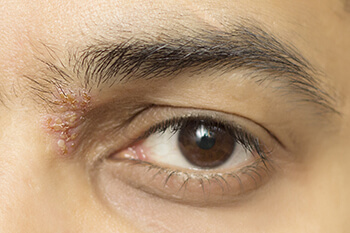Herpetic Eye Disease
 The virus that causes cold sores is the herpes virus. Most adults are exposed to this above-the-waist herpes virus during childhood. After the initial infection (which typically resembles a common cold), the virus lies dormant in a large nerve of the face. If the dormant virus reactivates, it may travel down the branch of the nerve which connects to the eye.
The virus that causes cold sores is the herpes virus. Most adults are exposed to this above-the-waist herpes virus during childhood. After the initial infection (which typically resembles a common cold), the virus lies dormant in a large nerve of the face. If the dormant virus reactivates, it may travel down the branch of the nerve which connects to the eye.
The virus can affect the eye in two ways.
Firstly, the virus may infect the skin that covers the cornea (the clear front window of the eye). This type of infection is treated with anti-viral pills by mouth. Usually, the infection resolves within 1-2 weeks without any scarring or vision changes.
Secondly, the virus may cause inflammation and swelling in the deeper parts of the cornea. Treatment involves steroid eye drops, as well as anti-viral pills by mouth. Symptoms typically improve within 1-2 weeks. However, in this situation, there is a chance of scar formation and the formation of unwanted blood vessels, which can both lead to long-term vision loss.
In either scenario, there is a 50% chance that the disease will recur after treatment of the first episode. Repeat episodes almost always affect the eye that had the initial problem. There are no known triggers for recurrences.
Visit the American Academy of Ophthalmology’s EyeSmart® website to learn more about Herpetic Eye Disease.



